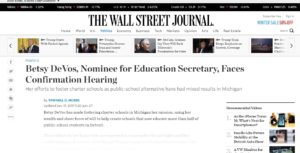
The problematic media coverage of Secretary of Education nominee Betsy DeVos — and how to make it better.
By Alexander Russo
Right after the presidential election, mainstream journalism went through an intense period of self-reflection and decided – among many things – that reporters and editors should try to check their liberal biases at the door and do a better job of covering people who weren’t like them. But that doesn’t seem to have happened yet – at least not looking at much of the national coverage of the Betsy DeVos nomination that we’ve seen since Thanksgiving.
Instead of giving readers a full, helpful understanding of the nominee and her background, national outlets including Politico, Slate, the Wall Street Journal, and (especially) the New York Times have cherry-picked storylines that put DeVos in a negative light and written about DeVos’s ideas and efforts using fraught, charged language.
Most of all, the coverage so far has largely missed the chance to help readers understand people and ideas from parts of America that aren’t dominated by the white, college-educated, liberal elite “bubble” that is so familiar to most education reporters.
Why all these issues? One reason may be that journalists have decided that DeVos’s policy ideas and nontraditional background represent such a serious departure that they don’t warrant the usual approach. For fear of “normalizing” a nontraditional nominee, education journalists may be taking a more aggressive approach to covering the process.
Or, they’re just struggling to make sense of a new world in which choice and vouchers and education outsiders have – with seeming suddenness – moved to center stage.
“In normal times, there would be more balanced press coverage,” said longtime education writer Richard Whitmire said in a phone interview. ”I just think everyone’s kind of crazy right now.”

One of the most obvious problems with DeVos coverage so far has been a failure to describe the political dynamics going on underlying surface events and competing claims.
For example, too few news stories about DeVos have highlighted the partisan nature of the battle going on over the nomination. A Democratic PAC published a massive opposition research file on DeVos but few gave it coverage. A lone Washington Post story explained to readers that the teachers unions were leading the anti-DeVos campaign – one of eight Trump nominees being targeted by Chuck Schumer and others.
“It does seem to me that a lot of the coverage has been kind of a proxy war for how you feel about school choice,” said Inside Michigan Politics editor Susan Demas in a recent interview.
Also, few if any of the national news stories focusing on DeVos’s campaign contributions noted that the American political system is awash in money. Her contributions are “being treated like it’s some unprecedented thing,” said Politico Magazine digital editor Zack Stanton, who wrote a recent profile of DeVos. “Every state has some version of the DeVoses.”
A complete accounting of the DeVos family political contributions would put them in context rather than presenting it as a singular example. One unusually helpful Washington Post story told us that Senate HELP committee members had received $250,000 from DeVos but didn’t say what percentage of more than $500,000 from the teachers unions went to Democratic committee members who oppose DeVos. Lazy comparisons to the Koch brothers don’t really count.
[The New York Times and Wall Street Journal declined to comment. The Washington Post and Politico did not respond.]
In addition, too few of the stories about the DeVos nomination have made clear to readers that DeVos will likely – even after Tuesday’s confirmation hearing and subsequent ridicule – be confirmed by the Republican-controlled Senate.
“Nobody in the conservative intellectual firmament is going to speak out against her, and no GOP senators will vote against her,” observed Vox’s Matt Yglesias last week.
Sure, the confirmation vote has been pushed back. Democrats might be able to knock off one or two nominees over the next few weeks. But so far at least there have been no Republican defections, and a recent story from the New York Times noted what few education readers may know: that many Democratic Senators will actually end up voting for Trump nominees.
Readers deserve to know what’s going on behind the scenes, not just the onstage play-by-play.

Much of the scrutiny of DeVos has focused on Detroit charter schools, even though DeVos doesn’t live near or particularly focus her work in Detroit. It’s an understandable connection. But Detroit has not been her sole or singular focus over the past 20 years. And according to DeVos defenders, the nominee is being unfairly blamed for the district’s woes and for its much-maligned charter school sector.
“Who’s responsible for Detroit’s decline? If you ask Republicans, they’ll say big labor. Democrats will say big business. And The New York Times, it seems, will say Betsy DeVos,” noted the right-leaning Manhattan Institute’s Max Eden and the Mackinac Center’s Ben DeGrow.
Things aren’t good in Detroit schools, that much is clear. But laying the blame on DeVos – or even on Detroit’s charter schools – seems like a narrow and misleading way to write about what’s going on there. The question isn’t just why Detroit charters aren’t better, it’s why Detroit schools – all of them – are so bad.
The “disoriented” post-Trump election press response has been to pile on with “a steady barrage of Detroit diatribes,” according to Whitmire, who’s concerned that readers following the DeVos nomination won’t understand the range of outcomes that choice has generated around the country.
Instead, readers are getting broad-brush descriptions of DeVos like this one from the New York Times: “A believer in a freer market than even some free market economists would endorse, Ms. DeVos pushed back on any regulation as too much regulation.”
Characterizations like these have been outlandish enough to generate public criticism from other education reporters, who are usually loathe to criticize each other’s work. The 74’s Matt Barnum noted that “some recent reporting on Betsy DeVos’s influence in Detroit has characterized her as being opposed to charter school accountability” despite “several provisions that fall under that [accountability] umbrella.”

In many of these recent pieces, DeVos has also been depicted as a powerhouse whose influence and reach are enormous – a frightening and/or impressive juggernaut who plays hardball and gets what she wants. She didn’t just help shape the 2016 Detroit education package, she bent Detroit to her will. She didn’t just use her money to influence elected officials. She’ played hardball. She didn’t just want to create alternatives to traditional schools. She wanted to break, gut, and dismantle public education. Think Darth Vader meets Cruella de Vil.
Hmm. Think about it a minute. If she was so persuasive and powerful, wouldn’t Michigan have a voucher program in place? Wouldn’t Detroit Public Schools have been dissolved by now? Wouldn’t her husband be governor? Wouldn’t her preferred candidate have won the Republican nomination for president? Wouldn’t she have given a more commanding performance during her Senate hearing?
Either national news outlets and education reporters have been asleep at the wheel for the past 20 years – failing to tell us until now about this powerful presence in education – or the recent depictions exaggerates her influence and her goals.

Last but not least, the dominant lens for much of the DeVos coverage has been the perspective of the legacy system of 15,000 semi-autonomous districts with students assigned to schools by neighborhood.
For all its many problems, the traditional system is familiar and has served some individuals and communities extremely well. And so it’s no surprise to see charter schools and vouchers depicted according to their perceived negative effects on traditional neighborhood school systems.
However, looking at charters and vouchers from the perspective of neighborhood district schools is a problematic way to cover education for at least one obvious reason: It tends to prioritize the concerns of districts and schools – and white, college-educated professionals who succeeded in school and know how to source a high-quality education for their offspring – over the needs of middle- and lower-income students and families who seek out alternatives to neighborhood district schools such as charters, vouchers, and homeschooling.
__
Some journalists would point out that there was a second big journalistic lesson from the Trump election: the need to push back against norm-breaking behavior, to refute false claims, stand up to power, and avoid “normalizing” outrageous behavior or unprecedented actions.
I understand that instinct. These are intense and confusing times. But for me, at least, DeVos doesn’t qualify for that approach. Unusual as she is as a nominee — the only precedents might be the handful of executives and retired generals hired by big-city school systems in the late 1990s – she’s not an outrageous or wildly unqualified pick. She’s no nearly as unqualified for the job as Ben Carson running HUD. Unless you count a dismal hearing performance, she is not taking actions or making claims that violate the usual norms. And her views, while unfamiliar to many and disagreeable to some, are not outside the norm for a conservative Republican in 2017.
The Show-Me Institute’s Michael McShane described her as “a fairly traditional, center-right education reformer.” Vox’s Yglesias described her as “fairly normal for a conservative Republican” in the current era.
In fact, her record is a fascinating and nuanced one. She is a former Common Core supporter who did not back Trump, a choice advocate who has spoken out about her own party’s resistance to racial integration, and a conservative reformer who agreed to a $617 million Detroit schools rescue package. In theory, she’s also wealthy and experienced enough to have an independent voice.
That’s why it’s a good thing there is time for reporters to tell us things we still don’t know enough about: the mix of DeVos’s successes and failures, how her education priorities and strategy have evolved over time, how her goals and accomplishments compare to other big-money education advocates of past and present.
There’s still time to tell us about her work in Grand Rapids, where she’s been involved more directly with the traditional school system, or how choice has fared in other places besides Detroit where she’s been active.
Her committee nomination vote has been pushed back until the end of the month.
ABOUT THE AUTHOR

Alexander Russo
Alexander Russo is founder and editor of The Grade, an award-winning effort to help improve media coverage of education issues. He’s also a Spencer Education Journalism Fellowship winner and a book author. You can reach him at @alexanderrusso.
Visit their website at: https://the-grade.org/













